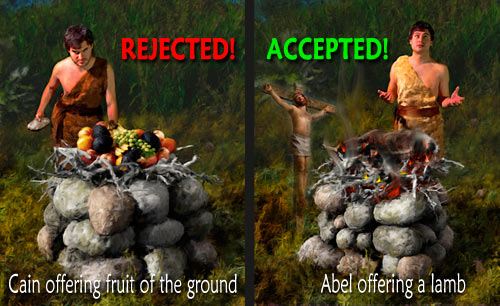Have you ever wondered why God did not accept Cain’s offering in Genesis 4? You have probably heard some sermons on this or have read about it in books. In this study of Genesis 4:4-5, we look at some of the theories of why God rejected Cain’s offering, and then seek an answer to this question by looking at why God accepted Abel’s offering, and what this tells us about Cain’s offering.

The Text of Genesis 4:4-5
Abel also brought of the firstborn of his flock and of their fat. And the Lord respected Abel and his offering, but He did not respect Cain and his offering. And Cain was very angry, and his countenance fell.
In this discussion of Genesis 4:4-5 we look at:
- The three theories about why God did not respect Cain’s offering
- Why Abel brought an offering in the first place
- Why Abel’s offering was not a blood sacrifice
- Why God respected Abel’s offering
- Why God did not respect Cain’s offering
Resources:
- a href=”https://redeeminggod.com/register/”>Become a Member of RedeemingGod.com
- Buy The Atonement of God on Amazon
- Subscribe and Leave a Review on iTunes
Downloadable Podcast Resources
Those who are part of my online discipleship group may download the MP3 audio file for this podcast and view the podcast transcript below.
You must join a discipleship group or login to download the MP3 and view the transcript.
Thanks for visiting this page ... but this page is for Discipleship Group members.
If you are already part of a Faith, Hope, or Love Discipleship Group,
Login here.
If you are part of the free "Grace" Discipleship group, you will need to
Upgrade your Membership to one of the paid groups.
If you are not part of any group, you may learn about the various groups and their benefits here:
Join Us Today.

Do you like learning about the Bible online?
Do you like learning about Scripture and theology through my podcast? If so, then you will also love my online courses. They all have MP3 audio downloads, PDF transcripts, quizzes, and a comment section for questions and interaction with other students.
If you want to deepen your relationship with God and better understand Scripture, take one (or all) of these courses. They are great for personal study or for a small group Bible study.
You can see the list of available courses here, and if you join the Discipleship group, you can take all the courses at no additional cost. Go here to learn more and join now.


![[#54] Genesis 4:4-5 – Why Did God Reject Cain’s Offering?](https://redeeminggod.com/wp-content/uploads/2016/10/4_cain-abel-sacrifices-150x150.jpeg)
![[#53] Genesis 4:1-3 – Raising Cain](https://redeeminggod.com/wp-content/uploads/2016/10/cain-150x150.jpg)

![[#52] Genesis 4 Introduction – The Story we Find Ourselves In](https://redeeminggod.com/wp-content/uploads/2016/10/business-ceo-lunch-150x150.jpg)

![[#51] Genesis 3 Summary – The Redemption of Sin](https://redeeminggod.com/wp-content/uploads/2016/09/Genesis-3-150x150.png)

![[#50] Genesis 3:22-24 – The Blessing of Death](https://redeeminggod.com/wp-content/uploads/2016/09/removed-from-garden-of-eden-150x150.jpg)
 Death.
Death.